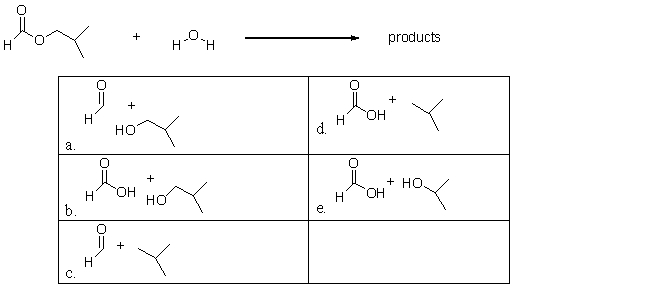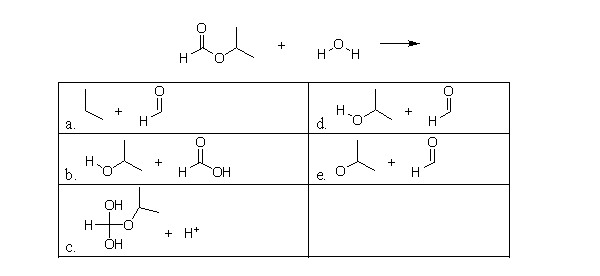A) hydration
B) dehydration
C) an acid-base reaction
D) another hydrolysis
E) condensation
G) C) and D)
Correct Answer

verified
Correct Answer
verified
Multiple Choice
Which food is NOT high in niacin?
A) oranges
B) anchovies
C) bran
D) peanuts
E) tuna
G) None of the above
Correct Answer

verified
Correct Answer
verified
Multiple Choice
The reaction of a carboxylic acid and an alcohol in the presence of a catalyst produces an ester and a molecule of water. Which of the labeled atoms below are involved in making the molecule of water? 
A) a and d
B) b and d
C) b, c, and d
D) a, c, and d
E) c, d, and e
G) B) and C)
Correct Answer

verified
C
Correct Answer
verified
Multiple Choice
What is the product when this compound undergoes oxidation? 
A) ![]()
B) ![]()
C) ![]()
D) ![]()
E) ![]()
G) A) and E)
Correct Answer

verified
Correct Answer
verified
Multiple Choice
Which classification of alcohols can undergo oxidation to yield a ketone?
A) Both primary and secondary alcohols yield ketones when oxidized.
B) Both secondary and tertiary alcohols yield ketones when oxidized.
C) Only primary alcohols yield ketones when oxidized.
D) Only secondary alcohols yield ketones when oxidized.
E) Only tertiary alcohols yield ketones when oxidized.
G) B) and D)
Correct Answer

verified
Correct Answer
verified
Multiple Choice
What does [O] represent in the following reaction? ![What does [O] represent in the following reaction? A) the oxidizing agent B) the species that is oxidized C) the reducing agent D) the species that is protonated E) atomic oxygen](https://d2lvgg3v3hfg70.cloudfront.net/TB7342/11eb145e_bfbd_7d8d_8021_771730b1482d_TB7342_00.jpg)
A) the oxidizing agent
B) the species that is oxidized
C) the reducing agent
D) the species that is protonated
E) atomic oxygen
G) A) and B)
Correct Answer

verified
Correct Answer
verified
Multiple Choice
What is the missing reactant for the following reaction? 
A) a
B) b
C) c
D) d
E) e
G) A) and B)
Correct Answer

verified
B
Correct Answer
verified
Multiple Choice
The enzyme that converts phenylalanine to tyrosine is an oxidoreductase that requires BH4, which is converted to BH4OH over the course of the reaction. BH4 is a(n)
A) enzyme.
B) protein.
C) coenzyme.
D) amino acid.
E) lipid.
G) C) and D)
Correct Answer

verified
Correct Answer
verified
Multiple Choice
What is the purpose of NAD+ in the body?
A) It is an oxidizing agent.
B) It is a reducing agent.
C) It donates oxygen.
D) It donates hydrogen.
E) It accepts oxygen.
G) A) and D)
Correct Answer

verified
Correct Answer
verified
Multiple Choice
Which of the following is the missing reactant in the reaction below, the hydrolysis of a thioester? 
A) a
B) b
C) c
D) d
E) e
G) All of the above
Correct Answer

verified
Correct Answer
verified
Multiple Choice
What are the products of the following reaction? 
A) a
B) b
C) c
D) d
E) e
G) C) and E)
Correct Answer

verified
Correct Answer
verified
Multiple Choice
Ascorbic acid, or vitamin C, is a water soluble vitamin. Which of the following interactions is primarily responsible for ascorbic acid's water solubility? 
A) dispersion forces
B) dipole-dipole forces
C) hydrogen bonding forces
D) ionic bonding
E) covalent bonding
G) A) and E)
Correct Answer

verified
Correct Answer
verified
Multiple Choice
In the following reaction, the sulfate ion does not react. What is this ion called? 
A) This ion has no special name.
B) It is a reactive ion.
C) It is a spectator ion.
D) It is an explosive ion.
E) It is a nonfunctional ion.
G) D) and E)
Correct Answer

verified
Correct Answer
verified
Multiple Choice
What is the product of the following hydrolysis reaction between an ester and water? 
A) a
B) b
C) c
D) d
E) e
G) A) and B)
Correct Answer

verified
Correct Answer
verified
Multiple Choice
The following reaction is the hydrogenation of an unsaturated fatty acid. Which of the following choices best describe molecules A and B? 
A) Both A and B are fats.
B) Both A and B are oils.
C) A is a fat and B is an oil.
D) A is an oil and B is a fat.
E) A is an oil and B is a trans-fat.
G) A) and B)
Correct Answer

verified
Correct Answer
verified
Multiple Choice
Cellular respiration and the combustion of fuel in a car engine are similar in many ways, but they also differ. What is one way in which they are different?
A) Cellular respiration occurs in many steps and the combustion of fuel in a single step.
B) Cellular respiration is exothermic and the combustion of fuel is endothermic.
C) Cellular respiration is endothermic and the combustion of fuel is exothermic.
D) Cellular respiration is fast and the combustion of fuel is slow.
E) Cellular respiration requires oxygen and the combustion of fuel does not.
G) A) and D)
Correct Answer

verified
Correct Answer
verified
Multiple Choice
Which of the following partial structures is an acyl group? 
A) a
B) b
C) c
D) d
E) e
G) B) and E)
Correct Answer

verified
B
Correct Answer
verified
Multiple Choice
The reaction of fatty acid A is an example of a(n) 
A) neutralization.
B) combustion.
C) oxidation.
D) reduction.
E) condensation.
G) A) and C)
Correct Answer

verified
Correct Answer
verified
Multiple Choice
Which of the following is NOT an example of an oxidation-reduction reaction?
A) ![]()
B) ![]()
C) ![]()
D) ![]()
E) ![]()
G) A) and C)
Correct Answer

verified
Correct Answer
verified
Multiple Choice
What type of reaction is this? 
A) oxidation
B) reduction
C) combustion
D) hydration
E) dehydration
G) None of the above
Correct Answer

verified
Correct Answer
verified
Showing 1 - 20 of 87
Related Exams